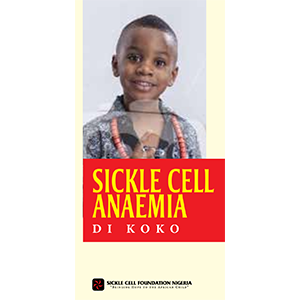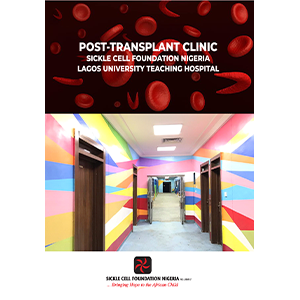
Unlock the power of knowledge with our Information, Communication, and Education (IEC) resources—empowering minds, shaping futures.
Coming soon...
Coming soon...
Coming soon...
Coming soon...
Coming soon...
Coming soon...
Visit our centre and see the work we do. We encourage prospective partners and current partners to establish an on-site presence at our centre to stay up to speed with our operations and the intricacies of our activities.

Get the latest updates and news directly to your inbox.
Leg ulceration is one of the chronic complications of sickle cell disorder occurring in one
ankle or
both. They are often painful, difficult to treat, and impair leading normal lives.
The incidence of leg ulceration among people living with sickle cell anaemia in West Africa is
6-7%.
Leg ulcers mostly affect people between 15-35 years. Leg ulcer treatment service is available at
the
Centre and affected persons can avail themselves of the treatment regime which has been tried
and
found to heal the ulcer faster.
At Sickle Cell Foundation Nigeria, over 61,000 persons have benefited from the free Leg Ulcer
Dressing and drug administration programme.
With Your Support, we can do more!
About 1 in 10 children between the ages of 2-16 years living with Sickle Cell anemia have a high
risk of developing strokes (Overt or Silent).
These debilitating complications can impede mobility and/or impair intellectual ability.
Happily, strokes can be prevented, if children at risk of developing them can be identified and
given treatments
At SCFN we have implemented a stroke prevention intervention through our Stroke Prevention Unit
using Transcranial Doppler (TCD) Scan machines to identify and prevent strokes in children with
SCD.
Since 2011 till date, the Foundation has provided over 30,060+ transcranial Doppler
scans for children living with sickle cell disorder. Children aged 2-10 years are most
vulnerable
but all children aged from 2-16 years are invited to have TCD scans once a year at the national
sickle cell centre.
We look forward to partners like you who would sponsor our extension of this health and
life-saving
service across the country and to subsidise this service to the barest minimum.
We run a state-of-the-art Haemoglobin, Chemistry as well as DNA Molecular Laboratory services -
Genotype determination, FBC, Hb Quantification, Liver Function Test (LFT), prenatal diagnosis
among
other haemoglobin, chemistry and molecular investigations.
Over 244,470 haemoglobin and chemistry investigations have been carried out in the laboratory
since
inception. These advanced facilities reflect SCFN’s commitment to providing accurate and
comprehensive diagnostic support for individuals affected by sickle cell disorder (SCD).
The reference Haemoglobin Laboratory at the National Sickle Cell Centre offers world-standard
accurate diagnosis thus eliminating the current high risk of obtaining incorrect Hb genotype
results, the laboratory results can be emailed to requesting doctors and clinics.
The SCFN organizes capacity-building training programmes regularly for different cadres of healthcare workers and other stakeholders. The training courses include:
We deliver genetic counseling at the National Sickle Cell Centre and in Sickle Cell Clinics and
Sickle Cell Clubs with highly trained personnel – volunteer or paid staff.
Prior appointments are necessary and sponsors are required to enable us to expand and sustain
this
essential service.
We provide prenatal diagnosis services to determine the genotype of unborn children. This
advanced
genetic testing method empowers expecting parents to determine the genotype of their unborn
child
during early
This advanced diagnosis provides couples-at-risk (when both parents carry the S or C trait e.g.
Hb
AS and Hb AS) of sickle cell offspring with the accurate information about their unborn
genotype,
allaying their anxieties and preparing them for timely interventions such as genetic counselling
and
appropriate early care, which go a long way to prevent/reduce the frequency of illness or
premature
death. Since the commencement of this service at the foundation, over 2750 individuals have
benefitted from this initiative.
Research is central to progress in all aspects of SCD. Some research projects are ongoing and plans for extensive molecular, pathological, clinical, and operational research on SCD are being made. We look forward to adequate funding for qualitative research training and performance in Nigeria.
With outstanding partner support, we have supplied free drugs and overseed the running of 16
dedicated Sickle Cell Clinics located in Kano, Asaba, Benin, and Lagos. We are currently
exploring
expansion opportunities to have more Sickle Cell Clinics across various states in Nigeria. These
clinics have, as expected, recorded improvement in the quality and longevity of the lives of
their
patients. The foundation has reached over 71,000 beneficiaries since the inception of this new
programme.
The goal of this intervention is to demonstrate to the host State Governments, the beneficial
impact
of Sickle Cell Clinics on the lives of affected persons and hopefully, encourage them to take
over
the running of the Clinics and expand their coverage within the State.
We Offer life-saving automated exchange blood transfusion using an APHERESIS MACHINE. An
increasing
number of patients with serious complications of SCD have begun to access this life-saving
service
at our national sickle cell centre.
With the Apheresis Machine, the transfusion procedure hardly lasts for up to one hour.
The Exchange Blood Transfusion procedure helps to improve vital oxygen delivery around the body,
improving the clinical condition of the patient more efficiently than a simple transfusion. It
is
done by simultaneously replacing abnormal Red Blood Cells (RBCs) in the patient with normal
Donor
Red Blood Cells (Hb AA cells).
EBT also helps to prevent or decrease Iron overload associated with simple top-up blood
transfusions. The automated system takes out the patient’s red blood cells and returns the
patient’s
own plasma in addition to the Hb AA Donor red cells, so as to reduce the number of defective Hb
SS
Red Blood Cells while also controlling fluid balance. EBT is able to reduce Hb SS red cells to
about
30 percent from the usual 85/90 percent.
We invest lots of resources in Educating the public through community outreaches, seminars, symposiums, virtual contact sessions, etc. to enlighten our public about the intricacies of Sickle Cell Disorder. This has helped us reshape narratives, deal with prejudice, close the ignorance gaps, influence positive lifestyle changes, challenge myths, and shed light on the barriers that have hampered the success of Sickle Cell Intervention efforts.
Bone Marrow Transplantation is the medically known cure for sickle cell disorder and we offer
this service at Sickle Cell Foundation Nigeria.
The Bone Marrow Transplant programme is a joint effort of the Sickle Cell Foundation Nigeria and
the Lagos University Teaching Hospital.
Before this cure programme started in-country, the Foundation in Partnership with IME
FOUNDATION-Mediterranean Institute of Heamatology Sponsored the bone marrow transplant of 50
persons.
Our Handbook for doctors and nurses developed in collaboration with the World Health Organisation (WHO) was a major resource in the Nigerian Federal Ministry of Health’s (FMOH) review of guidelines for the management of Sickle Cell Disorder in Nigeria. Our draft strategic plan that was presented to the HMH in 2018 was used as a resource in the development of the policy on NCDs by the Federal Ministry of Health.
For any questions or support, simply click on the live chat icon at the bottom right corner of your screen. Our team is available to assist you in real-time, but if we're offline, feel free to leave a message—we'll get back to you as soon as possible. Your inquiries are important to us, and we’re here to provide quick and efficient assistance.

Unlock the power of knowledge with our Information, Communication, and Education (IEC) resources—empowering minds, shaping futures.
We use cookies to enhance your experience. By continuing to visit this site you agree to our use of cookies. Learn more.


